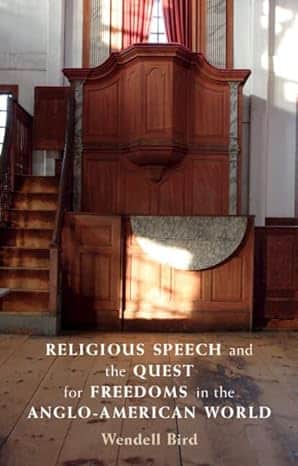Review of Wendell Bird, “Religious Speech and the Quest for Freedoms in the Anglo-American World.” New York: Cambridge University Press, 2023.
In addition to protecting freedoms of speech, press, peaceable assembly, and petition and prohibiting the establishment of religion, the First Amendment to the U.S. Constitution provides for religious free exercise. From time to time, cases arise, for example those involving compulsory flag salutes and other symbolic speech, in which the rights of speech and religion are intertwined.
Some individuals who are perfectly at ease with a variety of philosophic perspectives getting their due are disquieted when religious speech enters the public square. However, in this book Wendell Bird, a visiting professor at the Emory University School of Law who earned his doctorate of philosophy in legal history from Oxford and his doctorate of law from Yale, argues that most First Amendment and other freedoms that the U.S. Bill of Rights articulates received far greater impetus from religiously motivated individuals in the Judeo-Christian tradition than from more philosophical enlightenment thinkers.
In making his argument, Bird draws on prior path-breaking books that he has written about freedom of speech and press, particularly “The Revolution in Freedoms of Press and Speech From Blackstone to the First Amendment and Fox’s Libel Act” (2020) and “Press and Speech Under Assault: The Early Supreme Court Justices, the Sedition Act of 1798, and the Campaign Against Dissent” (2016). Both books depict vigorous exercises of speech and press that went far beyond William Blackstone’s’s narrow definitions, which largely limited such rights to prohibitions against governmental licensing and prior restraint of publication.
Freedoms of speech and press had religious speech motivations
Because of the union of church and state in Great Britain, the government classified criticism of both institutions as seditious libel that disturbed the peace, for which authorities often inflicted harsh punishments, usually with little to no due process protections. Puritans and other dissenters led the way in supporting both liberty of speech and press as a means of protecting liberty of conscience. Bird notes how frequently they referred to New Testament references to parrhesia, the Greek word for boldness, or liberty of speech (p. 5), which required greater obedience to God than to earthly authorities.
Citing scores of sources that have often been overlooked or underappreciated in scholarly analyses, Bird pays particular attention to John Milton and John Lilburne in Britain. His analysis of Lilburne, the intrepid Puritan Leveller who, without a legal education, represented himself in three different prosecutions, is particularly important in demonstrating how, in defending his own spoken and written words, Lilburne also expanded rights for criminal defendants. The protections that he helped to establish were later embodied in state bills and declarations of rights and within the Fourth, Fifth, Sixth, and Eighth Amendments of the U.S. Constitution.
Christians established most institutions of higher education in U.S.
Focusing on religion’s legacy in the field of higher education, Bird emphasizes that Christians established most institutions of higher education both in Britain and within the U.S. Roman Catholics founded Oxford and Cambridge prior to the Reformation, and Protestants founded most early colleges and universities, including Harvard, William and Mary, and Yale, within America. They typically did so with a view toward educating members of the clergy not only in Biblical principles but also in the classics.
Christianity’s influence on social issues extended to civil rights movement
Bird persuasively argues that Quakers and evangelical Christians, many of whom were converted in the Second Great Awakening, with support from liberal Protestants, provided much of the fuel for the movements to eliminate the slave trade and the institution of slavery both within Britain and the U.S. In a similar fashion, the modern civil rights movement was largely led and motivated by Christian clergy members and supported by African American churches. Martin Luther King Jr., who was influenced in part by the Social Gospel, is a particularly prominent example of this religious influence.
Bird acknowledges, but could provide greater elaboration of the fact, that dissenting religious groups, particularly the Puritans who settled in America, were not always as keen on extending the rights, which they had sought to secure for themselves, to dissenters within their own midst. Although he largely emphasizes evangelical Christianity, Bird acknowledges the contributions of individuals to reform movements who were not in this camp. He also recognizes that white evangelical groups within the South generally conformed to the racial prejudices of their region rather than continuing arguments for abolitionism.
Scholars have noted that one of James Madison’s consistent concerns, which was fueled by the persecution of Baptists and other dissenters in his home state of Virginia, was the protection of religious rights, which he sometimes included under rights of conscience. Bird suggests that Madison was far from alone in connecting such freedoms not only to other First Amendment rights but also to procedural protections for those accused of or on trial for crimes.
Generously footnoted to both primary and secondary sources, the book contains selected bibliographies and an index as well as some black and white illustrations. The volume serves as a caution that studies of British and American constitutional history and of Western political thought that ignore religious sources and motivations will lead to incomplete understandings of the origins of some of Anglo-Americans’ most cherished rights.
John R. Vile is a professor of political science and dean of the Honors College at Middle Tennessee State University.

